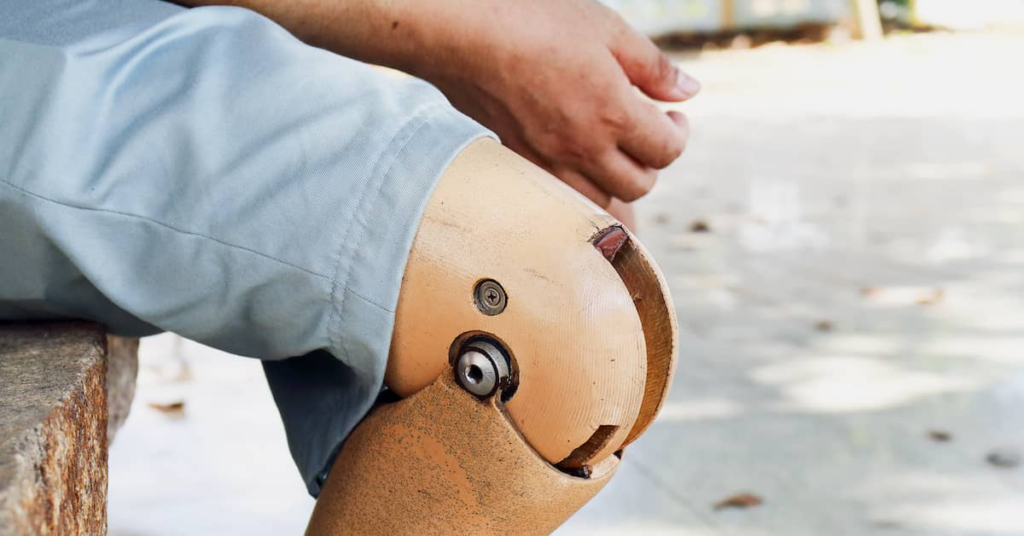
Losing a limb changes life in ways most people can't imagine. Whether it happens instantly during an accident or through medical complications caused by catastrophic injuries, the ordeal has a profound impact on your life and future. Compensation for an amputation injury provides a way to address the financial burdens and long-term challenges stemming from another party's carelessness or deliberate actions. If you're dealing with an amputation caused by someone else's wrongdoing, seeking legal guidance can help you understand your options for pursuing the compensation you deserve.
Read on to learn about the causes, damages, and legal processes involved in these cases. If you're struggling with an amputation injury, reach out to an amputation injury attorney near you today for a free consultation.
Statistics on Amputation Incidents
Every year, thousands of people in the United States experience amputation injuries. The Amputee Coalition estimates that more than 5.6 million people are living with limb loss or significant “limb difference” throughout the country. Many of these cases result from preventable accidents, underscoring the need for accountability. In a recent year, the total cost of amputations was more than $8.3 billion.
Trauma accounts for a significant portion of these injuries. Workplace incidents, motor vehicle crashes, and machinery accidents frequently lead to amputations. As these numbers reveal, negligence plays a substantial role in many cases, making it essential for victims to pursue justice.
Types of Accidents That Can Lead to Amputations
Amputation injuries often result from severe accidents that involve significant trauma. These life-altering injuries can arise from various situations, each presenting unique challenges and legal considerations. Below are the most common types of accidents that may lead to amputation injuries:
Motor Vehicle Accidents
Car crashes, motorcycle collisions, and truck accidents are among the leading causes of traumatic amputations. High-speed impacts can crush or sever limbs, particularly when vehicles collide with pedestrians, bicyclists, or motorcyclists. In some cases, emergency medical procedures to save a victim’s life might necessitate an amputation.
For example, a motorcyclist hit by a car may suffer injuries so severe that doctors have no choice but to amputate a leg to prevent infection or further complications. Such incidents often involve complex legal issues, including determining liability and securing compensation for extensive medical care.
Construction Site Incidents
Construction sites pose significant risks for workers and bystanders. Heavy machinery, power tools, and falling objects can cause devastating injuries, including amputations. For instance, a worker may lose a limb due to a malfunctioning saw or a crane accident.
In these cases, victims might have grounds for a personal injury claim if a third party’s negligence contributed to the accident. This could include manufacturers of defective equipment or subcontractors failing to follow safety protocols.
Medical Malpractice Cases
Mistakes during medical procedures can result in unnecessary amputations. Surgical errors, improper treatment of infections, or misdiagnosis of vascular conditions like blood clots can lead to the loss of a limb. In some cases, medical professionals may fail to act quickly enough to prevent the need for amputation.
Victims of medical malpractice may pursue compensation by demonstrating that a healthcare provider’s negligence directly caused their injury. These claims often require expert testimony to establish that the medical provider breached the standard of care.
Product Liability Incidents
Defective products can also lead to catastrophic injuries resulting in amputation. Faulty power tools, poorly designed machinery, or defective automobile parts are common culprits. For example, a defective lawnmower might malfunction and cause an injury severe enough to require amputation.
In product liability cases, injured parties may work with attorneys to file claims against manufacturers, distributors, or retailers that allowed unsafe products to reach consumers. These cases focus on proving that a design flaw, manufacturing defect, or inadequate warning label contributed to the injury.
Workplace Accidents
Amputation injuries are tragically common in workplaces where employees handle heavy machinery or dangerous equipment. Factory workers, agricultural laborers, and industrial employees face heightened risks of losing limbs due to entanglement in machinery or equipment malfunctions.
For example, a factory worker may suffer an amputation due to a conveyor belt lacking proper safety guards. While workers’ compensation typically covers such injuries, there may also be grounds for a third-party claim if another party’s negligence contributed to the incident.
Each of these accidents has its own legal complexities, but they all share one commonality: the devastating impact on the victim’s life. Pursuing a claim for an amputation injury allows victims to hold the responsible parties accountable and seek the resources they need to adapt and recover.
Compensable Damages Available in Amputation Cases
Recovering compensation after an amputation involves evaluating both economic and non-economic damages. These categories address the full spectrum of losses victims endure.
Economic Damages
- Medical Expenses: Costs include emergency treatment, surgery, hospitalization, and ongoing care.
- Prosthetic Devices: Expenses for prosthetics and future replacements can add up quickly.
- Rehabilitation and Therapy: Physical and occupational therapy help victims regain mobility and adapt to their new circumstances.
- Lost Wages and Earning Capacity: Amputations often affect a person’s ability to work, whether temporarily or permanently.
- Home and Vehicle Modifications: Wheelchair ramps, widened doorways, and modified vehicles may be necessary for daily life.
- Long-Term Care Needs: When a person requires assistance with basic tasks, the costs can be substantial.
Non-Economic Damages
- Pain and Suffering: Amputation involves both immediate and enduring physical pain.
- Emotional Distress: Losing a limb often leads to anxiety, depression, or other psychological impacts.
- Loss of Enjoyment of Life: Activities once taken for granted may no longer be possible or enjoyable.
- Loss of Consortium: Family relationships can suffer, affecting companionship and intimacy.
- Psychological Trauma and PTSD: The aftermath of the injury often involves enduring mental health struggles.
Punitive Damages
In rare cases, the court may award punitive damages if it deems the at-fault party’s actions egregiously negligent or unlawful. Although punitive damages serve to punish the wrongdoer and deter similar behavior, they can form a significant portion of a victim’s compensation package.
The Amputation Injury Claims Process
Seeking compensation for an amputation injury requires a thoughtful and thorough approach. Each step plays a role in ensuring that you receive the compensation you need to rebuild your life. A personal injury attorney can help you navigate the process, from gathering documentation to meeting legal deadlines to fighting for full compensation on your behalf. They can also help manage your expectations and keep you informed and involved throughout the process.
Proper Documentation is Key
To build a strong case, your attorney must thoroughly document your injury. Essential documentation includes;
- Medical records detailing the severity of the injury
- Surgical procedures
- Rehabilitation plans
- Prescribed treatments provide essential evidence
Photographs of the injury, records of hospital visits, and receipts for medical expenses add weight to your claim.
Additionally, documenting how the injury impacts your daily life can help paint a full picture of the non-economic damages, such as emotional distress or loss of enjoyment of life. Keeping a journal about your physical pain, emotional struggles, and adjustments to living with an amputation can make a difference.
The Role of Medical Experts
Medical experts often play a significant role in amputation injury claims. Their opinions can explain the extent of your injury, outline the medical care you require, and forecast future expenses, such as prosthetic replacements or ongoing therapy. These professionals also provide testimony that underscores the seriousness of your condition and its long-term impact on your life.
Timeline Considerations
Amputation injury claims can take time to resolve, especially when disputes arise over liability or the value of damages. While you may be eager to settle quickly, rushing could result in an undervalued claim. Building a strong case requires gathering evidence, consulting with experts, and thoroughly evaluating the long-term implications of the injury.
The timeline often depends on factors like the case's complexity, the other party's willingness to negotiate, and the legal system’s schedule. Staying patient and working with a skilled attorney can help ensure the outcome reflects your true needs.
Working With Insurance Companies
Insurance companies often try to minimize the amount they pay out. They might challenge the severity of your injury, question your expenses, or propose a low settlement. It’s essential to approach negotiations armed with solid evidence and legal representation that advocates for your interests.
If an insurance company refuses to offer a fair settlement, the next step could involve your attorney filing a lawsuit. While most cases settle out of court, being prepared to proceed to trial can pressure the insurance company to act reasonably.
Statute of Limitations
Time limits apply to filing an amputation injury claim. In Connecticut, the statute of limitations for personal injury cases is generally two years from the date of the injury. Failing to file within this window could result in losing your right to pursue compensation.
Although exceptions exist that may extend the time you have to file, you don’t need to wait. Acting quickly helps preserve evidence and allows your attorney time to build a strong claim for you.
When a government entity is responsible for the injury, additional steps and stricter deadlines might apply. For instance, Connecticut requires filing a notice of claim with the appropriate government office within six months of the injury. You need to contact an attorney immediately if you believe a government entity bears liability for your amputation injury.
Bottom Line
Navigating the amputation injury claims process demands attention to detail and a proactive approach. By working with an attorney to document everything thoroughly, consult medical experts, adhere to deadlines, and fight tenaciously for the best outcome possible, you can pursue the compensation you need to move forward.
Determining Fair Compensation for Amputations
Calculating appropriate compensation takes into account various factors. Each case is unique, and settlement amounts depend on the specifics of the injury and its consequences.
- Factors Affecting Settlement Value: The severity of the injury, age of the victim, and degree of fault play significant roles in determining the outcome.
- Life Care Planning: Experts assess future medical needs, caregiving expenses, and adaptive equipment to estimate long-term costs.
- Expert Testimony Requirements: Opinions from specialists help quantify damages and establish the need for certain types of care.
- Previous Case Precedents: Reviewing similar cases provides insight into potential settlement ranges.
- Settlement vs. Trial Considerations: While many cases resolve through settlements, insurance companies may refuse reasonable offers, necessitating trial preparation.
Steps to Protect Your Rights After an Amputation Injury
Taking swift and informed actions after an amputation can strengthen your claim and preserve your right to compensation.
- Seek medical attention immediately, even if injuries don’t appear severe at first.
- Obtain detailed records from doctors and specialists to provide evidence of the injury and its treatment.
- Consult a lawyer as soon as possible ensures you receive guidance tailored to your case.
- Keep accident reports, witness statements, and photographs of the scene to support your claim.
- Refrain from signing documents or accepting settlements without legal advice.
How an Attorney Can Help
Legal representation provides the resources and experience necessary to build a strong case and advocate for fair compensation.
- Attorneys offer a strategic approach to pursuing your claim.
- Lawyers gather evidence, consult experts, and craft compelling arguments.
- Attorneys know how to deal with insurance adjusters. They also have the persistence and skill to secure appropriate settlements.
- If a case goes to court, having a prepared legal team increases the likelihood of a favorable outcome.
Contact an Experienced Amputation Injury Lawyer Today

The attorneys at The Flood Law Firm understand the profound challenges amputation injuries create. Having served injured clients throughout Connecticut since 2012, we know how to pursue compensation that reflects the full scope of your losses. From investigating the incident to negotiating with insurance companies and fighting in court when necessary, our team provides compassionate and dedicated support every step of the way. If you’ve experienced an amputation injury due to someone else’s negligence, don’t face this battle alone. Contact The Flood Law Firm today for a free consultation and let us help you reclaim your future. We’ve recovered substantial settlements and verdicts for our clients, and you can rely on us to do all we can to maximize your financial recovery.
